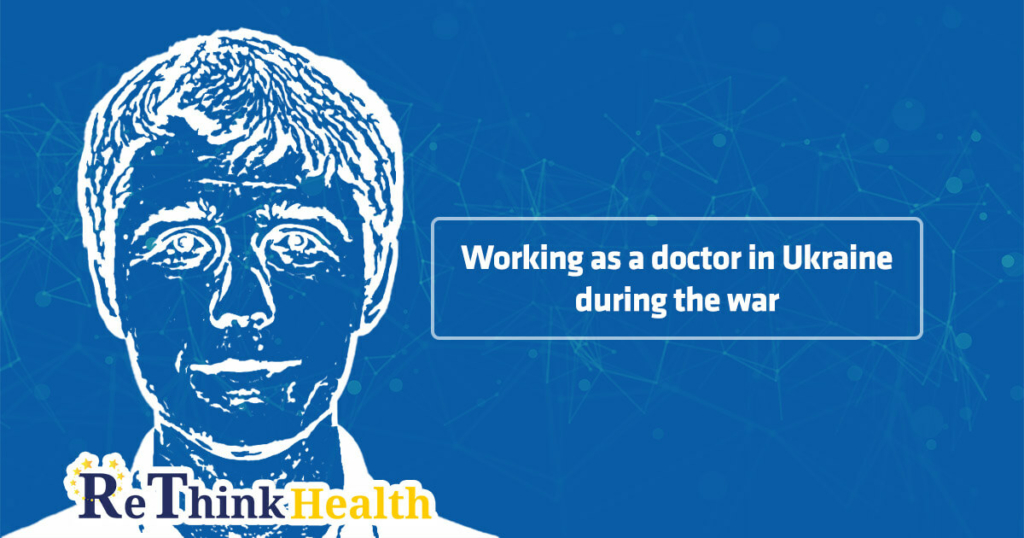I live and work as a doctor in Dnipro, a big city in the Eastern part of Ukraine. For me, the 24h of February began with sounds of explosions, dread, panic, the cold voice of an evil man on the news, announcing a special military operation in Ukraine… Since then, a large proportion of our country’s territories remains under the enemy’s occupation, while the rest of the country is suffering from constant bombing or exists under the risk of military invasion.
After a few days of panic, our city turned into a deserted place for the next few weeks. I did not know how to behave in case of an air raid, so I preferred not to stay outside. There were also messages about Russian spies and looters in the city. I remember that I was scared to go out of the house and I wished I had a gun in those days. It was a period of great uncertainty and insecurity; everybody was literally stuck to their cellphones in search of news from the battlefield. It was also a time of lack of products in shops, lack of gas at gas stations and drugs in pharmacies.
However, not everybody left the city. Those who decided to stay rushed to the volunteer centers and to the points of recruiting to army. Everywhere in the city there were organizations who took care of refugees, collected ammunition/meals/supplies for militaries, prepared the city for defense, and so on. This was happening throughout the whole country and, from this point of view, it was amazing how our nation united against the external threat.
Curfew, introduced on the first day of the war, taught us to stay at home in the evening and to avoid extra lightning when it is dark. I became anxious and suspicious of sudden sounds. I am constantly worried about my friends on the frontline. I am tired of frequent “air raids” announced by the sirens. Although I understand that hearing a siren is a good sign – there is a siren, while in many Ukrainian towns there isn’t any – it is difficult to get used to it. And when I am sitting in the shelter and the walls around me are shaking, I couldn’t say better than Ukrainian comic Michael Schur. Paraphrasing his words, during the bombing there are few thoughts in my head: “What am I doing here? Will I be fine?”, but after the bombing, bravery appears out of nowhere: “Ha-ha, once again you’ve missed, you should have eaten better” (a common saying in Eastern Europe). But this is only till the next air raid, an endless emotional roller coaster… Of course, I don’t remember when I normally slept the last time. And I find it difficult to maintain my productivity and pay attention to education and self-improvement in such conditions.
As well as my daily routine, my working life has also changed. Public transport issues make it more difficult to commute to my hospital, and for the same reason not all the patients are able to reach us. A lot of them were lost for follow-up due to being directly involved in the war or because of migration. Those who did not flee are usually not too attentive to their own health. So, while we see fewer patients on the planned follow-ups, the number of acute or decompensated diseases is increasing. People are hesitant to go to the hospitals. Often, people from our region who need in-patient treatment decide to postpone it because they are afraid to leave their families even for a short period of time. Moreover, after each received signal about the anticipated attack from the air, we ask our patients to go to a shelter. Of course, they quickly become anxious and unsatisfied with their stay in the hospital. We also have a lot of inner migrants here in Dnipro, many people from the places where severe battles took place, like Mariupol. And it is difficult sometimes to remain a professional and do your job instead of asking them about their escape.
As a closing note, I would like to tell the words of gratefulness to our Army, Government and our friends from different countries that make it possible to maintain relatively normal lives for a large part of our country. I am inspired by the resilience of our people, and their bravery inspires me to do my job as a clinician and as a researcher, again and again. There is still a lot to do, but I am sure that with the help of our partners we will overcome existing challenges, Russian soldiers will be expelled from our territory and peace will return to Ukraine.

